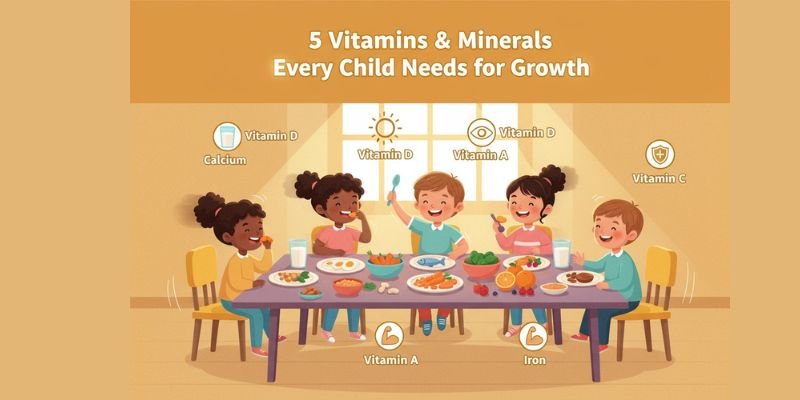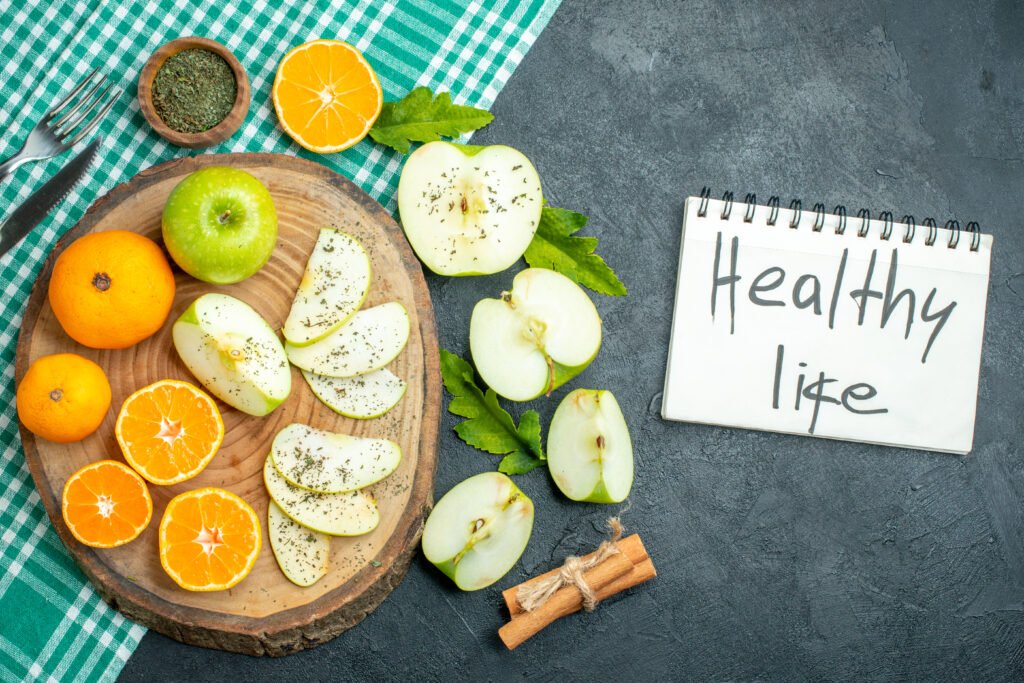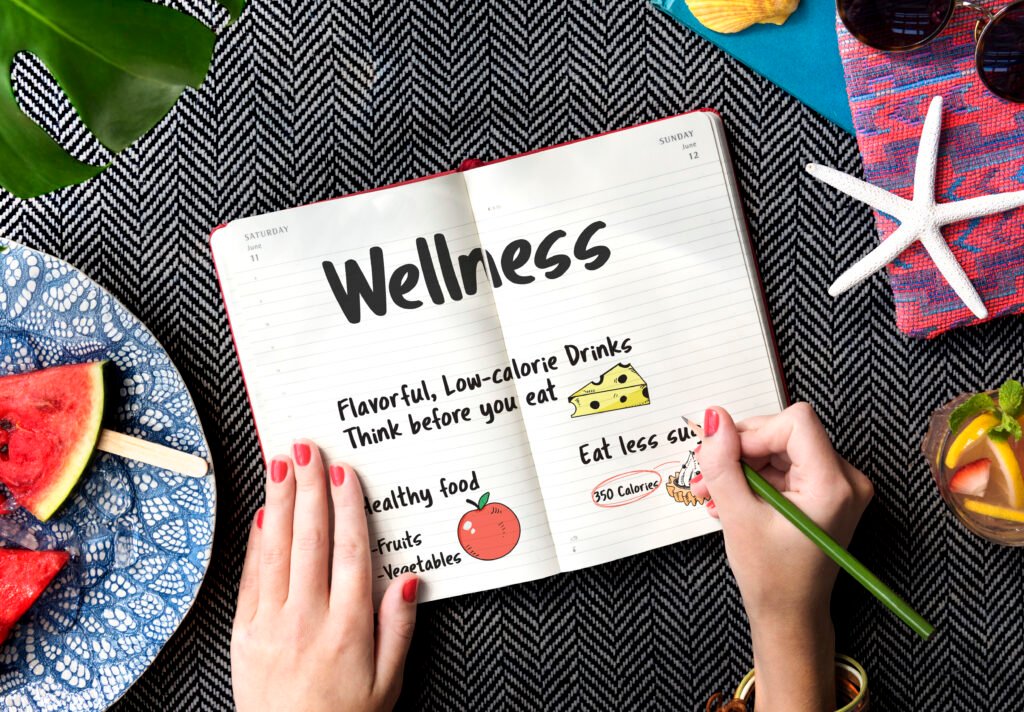Every parent wants their child to grow up healthy, strong and full of energy. But with so much conflicting nutrition advice out there, it’s easy to feel overwhelmed. Here’s the good news: you don’t need to be a nutritionist to support your child’s development. Understanding just 5 vitamins & minerals every child needs for growth can make a world of difference.
These 5 Vitamins & Minerals Every Child Needs for Growth are the building blocks your child’s body needs for everything from strong bones to a sharp mind. Whether you’re packing school lunches or planning family dinners, knowing which nutrients matter most and where to find them will help you make confident choices that set your child up for lifelong health.
Let’s dive into the five superstars of childhood nutrition and discover simple, practical ways to include them in your family’s everyday meals.
Why Growing Bodies Need Vitamins and Minerals
Think of vitamins and minerals as tiny construction workers inside your child’s body. While they’re needed only in small amounts, they’re responsible for massive jobs: building bones, powering brain cells, fighting off germs and even helping wounds heal.
Vitamins keep your child’s immune system alert, their skin glowing and their vision sharp. Minerals strengthen bones and teeth, regulate heartbeat and support muscle function. Together, they create the foundation for healthy child development.
The beauty of whole foods is that they deliver these nutrients naturally, in forms the body recognises and absorbs easily. While supplements have their place, a colourful, varied diet is always the gold standard for meeting your child’s nutritional needs.
The 5 Essential Nutrients Every Child Needs
1. Vitamin D – The Sunshine Vitamin for Strong Bones
Vitamin D is your child’s bone-building champion. Without it, even calcium-rich foods can’t do their job properly. This vitamin acts like a key, unlocking the door so calcium can enter bones and teeth, making them dense and strong.
Why it matters:
- Supports rapid bone growth during childhood and prevents rickets.
- Boosts immune function and mood regulation.
- Critical during growth spurts.
Where to find it:
- Sunlight exposure: 10-15 minutes of morning sun several times a week.
- Fatty fish: Salmon, mackerel, sardines.
- Fortified foods: Milk orange juice, cereals.
- Egg yolks: A convenient breakfast option.
Parent tip: Many children spend most of their time indoors. If your child doesn’t get regular outdoor activities, talk to your paediatrician about checking vitamin D levels, especially during winter months.
2. Vitamin A – The Vision and Immunity Guardian
Vitamin A is like your child’s internal security system. It protects their eyes, strengthens their immune defences and supports healthy growth of skin and tissues throughout the body.
Why it matters:
- Essential for proper vision, especially in low light.
- Helps the body fight infections and recover from illness.
- Supports healthy skin and growth of organs.
Where to find it:
- Orange and yellow vegetables: Carrots, sweet potatoes, pumpkin.
- Dark leafy greens: Spinach, kale.
- Colourful fruits: Mangoes, papayas, cantaloupe.
- Dairy products: Milk, cheese, butter.
Parent tip: Notice a pattern? The more colourful the vegetable, the more vitamin A it likely contains. Make meals fun with a rainbow challenge where kids try creative vegetable recipes that hide nutrition in delicious ways.
3. Vitamin C – The Healing Hero
When your child scrapes their knee or catches a cold, vitamin C is working overtime behind the scenes. This powerful antioxidant doesn’t just boost immunity. It helps the body heal, absorb iron and build strong connective tissue.
Why it matters:
- Strengthens the immune system to fight infections.
- Speeds up wound healing and tissue repair.
- Helps the body absorb iron from plant-based foods.
Where to find it:
- Citrus fruits: Oranges, grapefruits, lemons.
- Berries: Strawberries, blueberries, raspberries.
- Tropical fruits: Guava, kiwi, pineapple.
- Vegetables: Bell peppers, tomatoes, broccoli.
Parent tip: Vitamin C is water-soluble, meaning the body doesn’t store it. Your child needs fresh sources daily. The good news? Most kids naturally love fruits, making this one of the easiest nutrients to include. Try these healthy fruit-based snacks that pack vitamin C.
4. Calcium – The Bone Builder
Think of calcium as the bricks that build your child’s skeletal structure. Nearly 99% of the body’s calcium is stored in bones and teeth, making it absolutely critical during the high-growth years of childhood and adolescence.
Why it matters:
- Builds strong bones and teeth
- Supports proper muscle function and nerve transmission
- Establishes bone density that protects against osteoporosis later in life
Where to find it:
- Dairy products: Milk, yoghurt, cheese, paneer
- Leafy greens: Kale, bok choy, broccoli
- Fortified foods: Plant-based milks orange juice, tofu
- Fish with edible bones: Sardines, canned salmon
- Seeds and nuts: Sesame seeds, almonds
Parent tip: Calcium works best when paired with vitamin D. Serve calcium-rich foods alongside vitamin D sources for maximum absorption. For children with lactose intolerance or dairy allergies, plant-based options like fortified almond milk and leafy greens work wonderfully.
5. Iron – The Energy and Brain Booster
Iron is the unsung hero of childhood development. It carries oxygen to every cell in your child’s body, including their rapidly developing brain. Without enough iron, kids can feel tired, struggle to concentrate and get sick more often.
Why it matters:
- Creates hemoglobin, which carries oxygen in the blood
- Supports cognitive development and learning ability
- Maintains energy levels and prevents fatigue
Where to find it:
- Animal sources: Red meat, chicken, turkey, fish, eggs
- Plant sources: Lentils, chickpeas, beans, tofu, spinach
- Fortified foods: Iron-fortified cereals, bread
- Nuts and seeds: Pumpkin seeds, cashews
Parent tip: Plant-based iron isn’t absorbed as easily as iron from meat. Serve iron-rich plant foods with vitamin C sources to boost absorption – try lentil soup with tomatoes or fortified cereal with orange slices. Learn more about preventing iron deficiency in children.
Practical Daily Nutrition Tips for Busy Parents
Knowing which nutrients matter is one thing – getting them into your child’s daily diet is another. Here are realistic strategies that work for real families:
1. Think in Colour, Not Perfection
Aim for a variety of colours on the plate. Red tomatoes, orange carrots and green broccoli – each colour represents different nutrients.
2. Make Smart Swaps
Replace sugary drinks with water or milk, swap chips for veggie sticks with hummus and choose whole-grain bread over white bread.
3. Create a Snack Station
Keep healthy options accessible: washed fruits, cheese sticks, nuts, yoghurt and whole-grain crackers. When kids can grab healthy snacks themselves, they’re more likely to choose them.
4. Involve Kids in Cooking
Children who help prepare meals are more likely to eat them. Let younger kids wash vegetables or tear lettuce. Older children can measure ingredients or assemble their own wraps.
5. Model Healthy Eating
Kids watch what you do more than what you say. When they see you enjoying vegetables and making healthy choices, they’re more likely to follow suit.
Conclusion
Raising healthy kids doesn’t require perfection. It simply requires consistent attention to 5 Vitamins & Minerals Every Child Needs for Growth: vitamin D, vitamin A, vitamin C, calcium and iron.
Focus on these core principles:
- Variety is key – different colours, food groups and textures
- Consistency matters more than perfection
- Food first, supplements second
- Model healthy behaviour.
- Keep mealtimes positive and stress-free
Remember, you’re not just feeding your child for today. You’re establishing patterns that will influence their health for decades. Every balanced meal is an investment in their future wellbeing.
The habits you build now will become your child’s normal and that’s the real gift of childhood nutrition.
Continue Your Learning Journey
Related articles you might find helpful:
- Age-by-Age Nutritional Requirements Guide
- Plant-Based Nutrition for Growing Kids
- Sports Nutrition for Young Athletes
- Managing Food Allergies in Children
- Healthy School Lunch Ideas
Medical Disclaimer: This article is for informational purposes only and does not constitute medical advice. Always consult with a qualified healthcare provider regarding your child’s specific nutritional needs.



